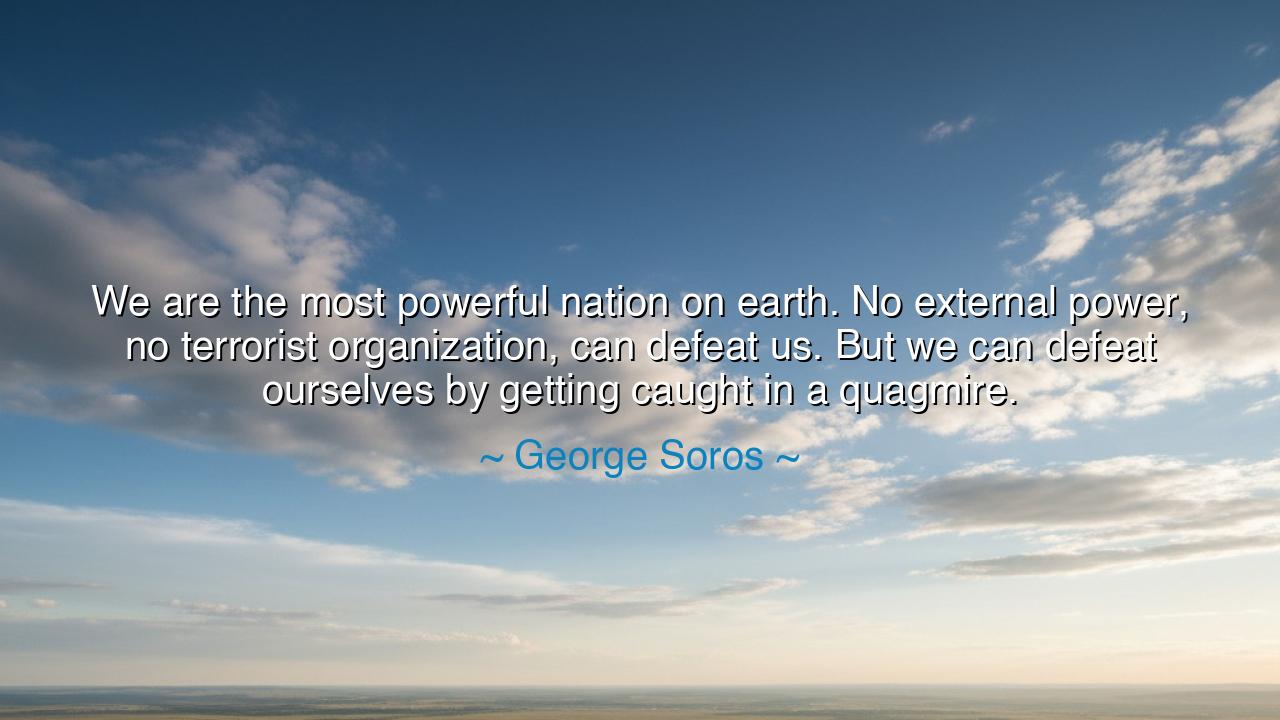
We are the most powerful nation on earth. No external power, no
We are the most powerful nation on earth. No external power, no terrorist organization, can defeat us. But we can defeat ourselves by getting caught in a quagmire.






In these solemn and prophetic words, George Soros speaks of the paradox of power and the hidden dangers that lie not outside a nation, but within it. He declares that no external power nor terrorist organization can truly bring down a mighty empire, for strength in arms and wealth can repel enemies from without. Yet, he warns, a nation can defeat itself if it becomes ensnared in a quagmire—a trap of its own making, born from arrogance, overreach, or endless conflict. His words are a call to vigilance, urging future generations to understand that the gravest threats often arise from within the very walls of greatness.
The origin of this truth echoes through the rise and fall of civilizations. In ancient Rome, no barbarian horde could destroy the empire at its height of power. The Roman legions were unmatched, their borders secure. Yet Rome began to crumble from within: corruption spread among its leaders, factions tore the Senate apart, and endless foreign campaigns drained its vitality. When Rome finally fell, it was not merely because of invaders at the gates, but because the empire had been hollowed out by its own internal decay. Soros’s warning mirrors this ancient lesson: true defeat begins in the heart of a nation.
The image of a quagmire is deeply symbolic. Just as a soldier trapped in a swamp struggles harder only to sink deeper, so too can nations become trapped in wars or policies without clear purpose. History offers the example of the Vietnam War, where the United States, though vastly more powerful than its opponent, found itself mired in a conflict it could not win decisively. The strength of its military was unmatched, yet the war eroded unity at home, sowed distrust in government, and weakened the very foundations of the nation. The enemy did not defeat America; America wounded itself through entanglement and division.
Soros’s words also speak to the human spirit, for what is true of nations is true of individuals. A person may withstand the assaults of the world—criticism, hardship, even betrayal—yet be undone by their own choices, fears, or pride. Just as a mighty fortress can collapse from rot within, so too can a person’s inner weaknesses lead to their downfall. Thus, his warning is both political and deeply personal: self-mastery is the key to survival.
Ultimately, this quote is a call for wisdom, restraint, and unity. Greatness is not measured merely by power, but by the discipline to use it wisely and sparingly. A nation must avoid the traps of endless conflict, pride, and internal strife, lest it destroy itself while enemies merely watch from afar. Let these words be a guiding light for future generations: no external force can break a people who remain vigilant and united, but even the most powerful empire can fall if it loses sight of its own soul.






DKTran Dang Khoa
Soros’s perspective is a stark reminder that power alone does not guarantee survival. The greatest threat may not come from outside forces, but from the nation’s own internal struggles. How do we protect ourselves from becoming so confident in our strength that we ignore the risks within? Can a powerful nation remain humble enough to avoid falling into a self-made quagmire?
BVbi vt1
The idea that the most powerful nation can defeat itself is a powerful cautionary tale. It makes me wonder how much of a nation’s strength lies in its ability to avoid self-destructive behaviors. How much of a country’s downfall can be attributed to internal strife or poor leadership? What lessons can we learn from history to avoid this kind of fate?
MTPham Minh Thuan
Soros highlights the paradox that the strongest nations can often defeat themselves through poor choices, and it’s a sobering thought. Is there a point where a nation’s power becomes its own enemy? How do we balance military strength and political influence while avoiding the pitfalls of arrogance or overextension? What can be done to prevent a nation from falling into the very quagmire it tries to avoid?
CTcao tranhuykhanh
Soros’s warning about getting caught in a quagmire resonates deeply. It’s a reminder that no matter how powerful we are, unchecked decisions or unexamined policies can lead to our undoing. How often do we overlook the impact of our own actions or inactions? Is it possible for a nation to be both powerful and vulnerable to self-inflicted harm?
VHvu hoang
This quote seems to suggest that while we may be the most powerful nation, our biggest danger lies in overreaching or failing to address internal issues. Could it be that we sometimes become so focused on external threats that we forget to manage the risks within our own borders? How much of a nation’s downfall can be attributed to its inability to control internal divisions?